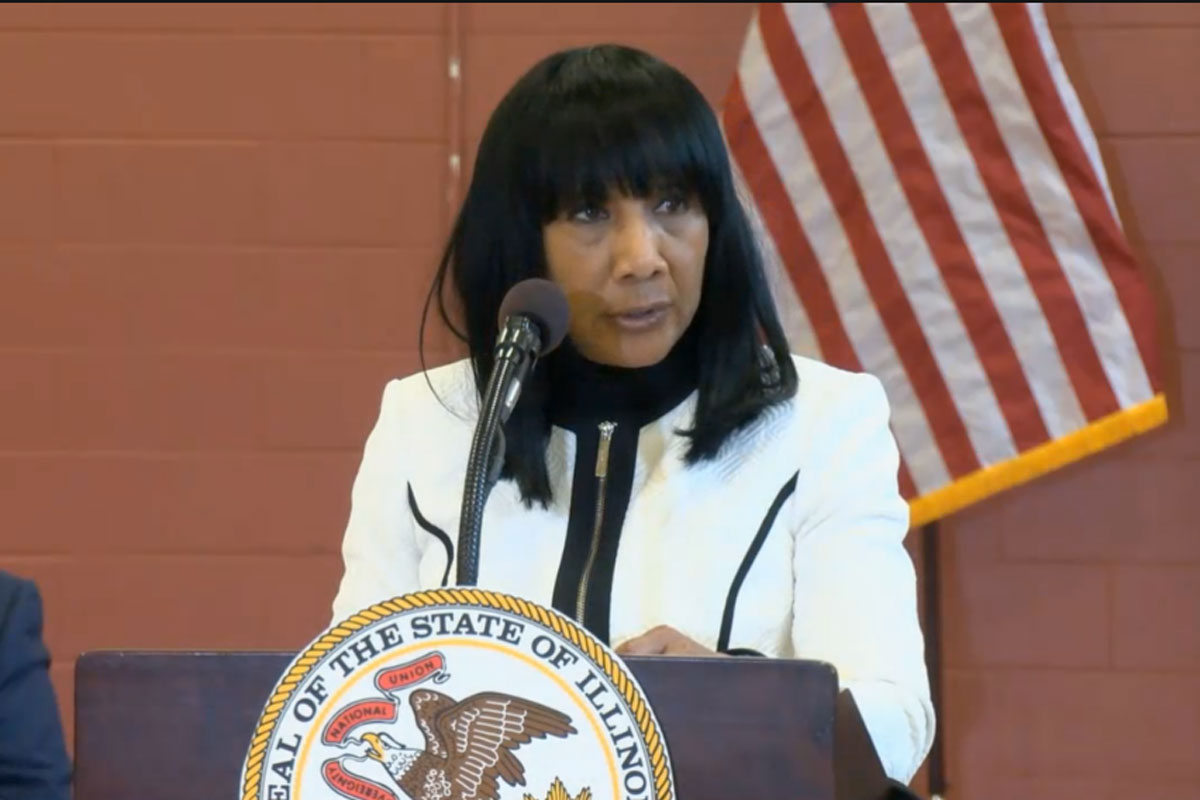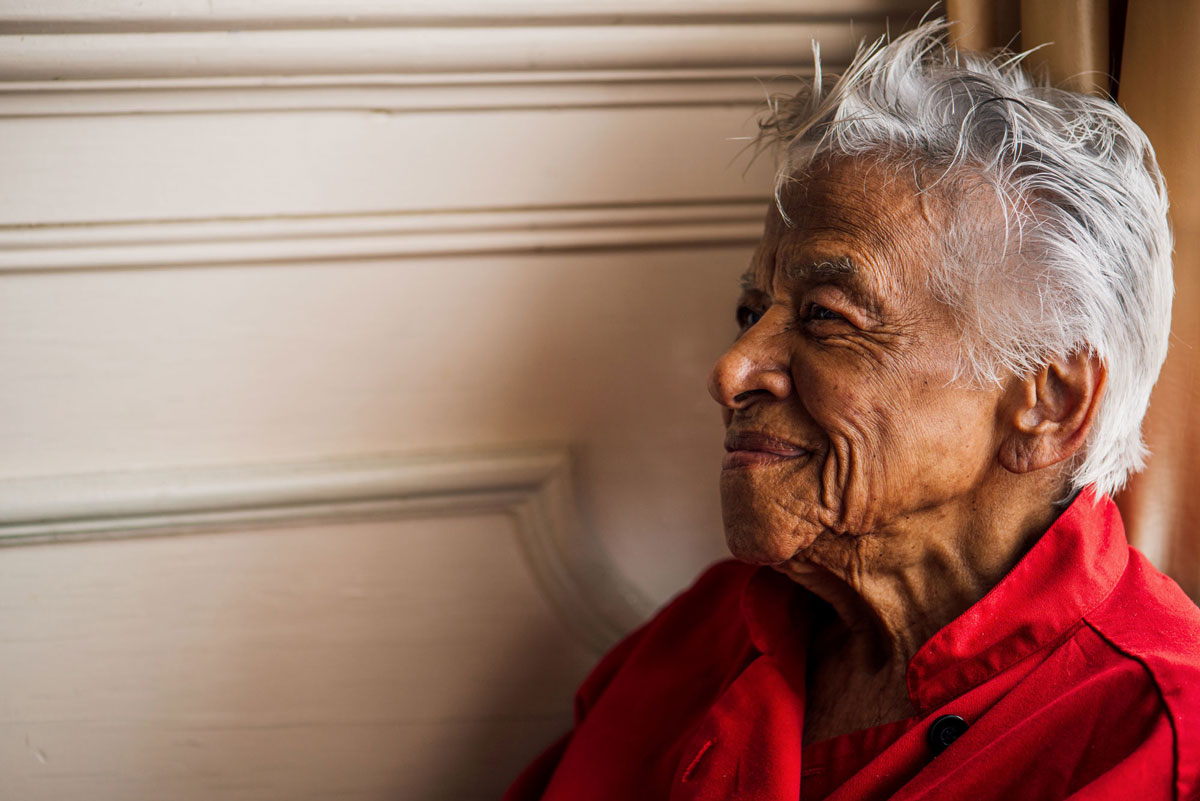- Details
- Category: Senator Jacqueline Y. Collins News

CHICAGO – Felony convictions for prostitution would be expunged under a measure introduced by State Senator Jacqueline Collins (D-Chicago) as part of an effort to reduce the stigma that follows those with felonies on their record even as prostitution is no longer charged as a felony in Illinois.
“By criminalizing prostitution, we have succeeded only in driving those who have become victims of it into the shadows,” Collins said. “We moved to stop charging prostitution as a felony, but that means nothing for those who have felonies on their records.”
Felony charges can be a significant barrier to finding housing or gainful employment, which only adds further injury to sex workers. Felony prostitution charges were ended in Illinois in 2013, but those with such convictions are still subject to all the penalties that come with a felony record.
“To allow felony charges to persist for sex workers is to send the message that they are akin to armed robbers or kidnappers. This, in turn, makes the business even more dangerous and exploitative,” Collins said. “We must begin a new chapter in how we address sex work, starting with expunging these records.”
- Details
- Category: Senator Jacqueline Y. Collins News
 CHICAGO – State Senator Jacqueline Collins (D-Chicago) joined Gov. JB Pritzker Tuesday as he signed the Predatory Loan Prevention Act, the culmination of years of work on the part of Collins and advocates to rein in the payday loan industry.
CHICAGO – State Senator Jacqueline Collins (D-Chicago) joined Gov. JB Pritzker Tuesday as he signed the Predatory Loan Prevention Act, the culmination of years of work on the part of Collins and advocates to rein in the payday loan industry.
The legislation caps payday loan rates at 36%. Illinois will join 17 states and the District of Columbia in instituting such a cap.
“I was proud to stand as chief co-sponsor to this legislation,” Collins said. “Payday loans are targeted directly at communities of color and only reinforce the dynamics that keep poor families poor. I applaud Governor Pritzker’s action today and thank the people who have called for this long-overdue new law.”
- Details
- Category: Senator Jacqueline Y. Collins News
 State Senators Jacqueline Collins and Robert Peters joined several nonprofit groups and Illinois AARP at a press conference today highlighting the results of a recent study showing vast disparities in access to health care and other services which are leaving elders in communities of color worse off.
State Senators Jacqueline Collins and Robert Peters joined several nonprofit groups and Illinois AARP at a press conference today highlighting the results of a recent study showing vast disparities in access to health care and other services which are leaving elders in communities of color worse off.
"It is critical that we address the longstanding inequities that exist in older communities of color across our state. As a senator and member of the Illinois Legislative Black Caucus, I have long championed policy solutions to end the inequities faced by our older Illinoisans of color, and continue to do so today through a robust social justice agenda spearheaded by the Illinois Legislative Black Caucus," said Collins (D-Chicago). "With the onset of the COVID-19 pandemic and the devastating effects of the pandemic on older adults in particular, the need to focus on these older communities of color is paramount."
- Details
- Category: Senator Jacqueline Y. Collins News
 CHICAGO – State Senator Jacqueline Collins renewed her call to correct the disparity in vaccination between Chicago’s wealthier white neighborhoods and poorer neighborhoods of color Tuesday, citing recent reports in major news outlets showing that the United States, and Chicago in particular, are not vaccinating Black people and other communities of color at the same rate as white Americans.
CHICAGO – State Senator Jacqueline Collins renewed her call to correct the disparity in vaccination between Chicago’s wealthier white neighborhoods and poorer neighborhoods of color Tuesday, citing recent reports in major news outlets showing that the United States, and Chicago in particular, are not vaccinating Black people and other communities of color at the same rate as white Americans.
“When the COVID-19 pandemic began to claim lives in America, Chicago’s South Side had the sad distinction of being the home of the city’s first known victim. As it continued, testing was particularly scarce in these same neighborhoods, even as infection rates and hospitalizations soared,” Collins said. “And now, as we finally inch toward the light at the end of the tunnel, we see reports that these same neighborhoods are among those receiving the fewest vaccines.”
Read more: Collins: City must study, rectify vaccine disparity
- Details
- Category: Senator Jacqueline Y. Collins News
 CHICAGO – In light of reports showing familiar disparities in ongoing COVID-19 vaccination efforts between Chicago’s well-to-do communities and majority-minority communities, State Senator Jacqueline Collins called on Gov. Pritzker Monday to focus resources on the same neighborhoods that are suffering from the highest rates of infection and death but are to date seeing the slowest rollout of the vaccines.
CHICAGO – In light of reports showing familiar disparities in ongoing COVID-19 vaccination efforts between Chicago’s well-to-do communities and majority-minority communities, State Senator Jacqueline Collins called on Gov. Pritzker Monday to focus resources on the same neighborhoods that are suffering from the highest rates of infection and death but are to date seeing the slowest rollout of the vaccines.
“When the pandemic began, we saw disparities in infections and deaths,” Collins said. “As it continued, we saw disparities in testing and care. Now, we are seeing disparities in reaching the light at the end of the tunnel. These disparities are literally killing us. I am calling on Gov. Pritzker to interrogate the reasons that the most affluent North Side ZIP codes are seeing such success in vaccination while impoverished communities like mine are struggling, even as we’re seeing the worst rates of spread. And I am calling on him to do something about it.”
A recent report from the Chicago Tribune showed vaccination rates in areas of the city such as the Magnificent Mile and Wicker Park have been relatively high, while rates in areas like Englewood have been much lower. Early data indicates white Chicagoans are twice as likely to receive the vaccine as other groups, the Tribune reported. The Associated Press also reports that the disparity is hardly unique to Chicago.
Another report out yesterday shows the same neighborhoods that have dealt with long-term issues such as pollution are also struggling to get a place in line for vaccinations.
“The governor moved to rectify testing disparities in the Auburn Gresham area when we pointed them out, and now it is home to the city’s state-run, free testing site,” Collins said. “I am again calling on him to recognize that a more targeted effort is needed to immunize the communities where this virus has struck the hardest.”
- Details
- Category: Senator Jacqueline Y. Collins News
 CHICAGO – State Senator Jacqueline Collins (D-Chicago) urged young women aged 14 to 18 to step up and apply to join the Illinois Council on Women and Girls to help shape the policies that will ensure a more equal future for female citizens in Illinois.
CHICAGO – State Senator Jacqueline Collins (D-Chicago) urged young women aged 14 to 18 to step up and apply to join the Illinois Council on Women and Girls to help shape the policies that will ensure a more equal future for female citizens in Illinois.
“I pushed for the creation of the Illinois Council on Women and Girls because despite some progress, women still have far to go to reach true equality in America,” Collins said. “And these policies are of even greater importance to our young women: Access to health, education, an equal wage, and so many other issues are apparent when we look to the lived experiences of our young women. We need to hear their voices.”
Collins sponsored legislation creating the council with the goal of studying the systemic barriers faced by women and girls in Illinois and developing clear policy goals to address them. Led by Lt. Gov. Juliana Stratton, the council issued its first report in March of last year, available here.
Read more: Collins invites young women to join Illinois Council on Women and Girls
- Details
- Category: Senator Jacqueline Y. Collins News
 CHICAGO – Payday lenders will be prohibited from issuing loans with rates higher than 36% and Illinois government will require certain financial institutions to meet the needs of local communities under major reforms led by State Senator Jacqueline Collins (D-Chicago) and the Illinois Legislative Black Caucus this past week.
CHICAGO – Payday lenders will be prohibited from issuing loans with rates higher than 36% and Illinois government will require certain financial institutions to meet the needs of local communities under major reforms led by State Senator Jacqueline Collins (D-Chicago) and the Illinois Legislative Black Caucus this past week.
Language from two major pieces of legislation by Collins, Senate Bills 1608 and 1792, were included in a comprehensive Black Caucus economic reform measure that passed the Illinois General Assembly Wednesday.
“How many of you want to get a credit card, maybe from Macy's or Neiman Marcus, at 80%, 99%?” Collins asked senators in her remarks prior to the bill’s passage in the Senate. “This is preying on certain communities. It's really a rebirth of redlining, housing covenants and all the other ills that have decimated my community. What we're trying to do is ensure they have an opportunity to build economic stability.”
Read more: Collins wins tougher regulations on payday lenders, new Community Reinvestment Act
- Details
- Category: Senator Jacqueline Y. Collins News
 CHICAGO – The state-operated community-based testing site at Foreman Mills has moved to a new location at the former Save-A-Lot at 7938 S. Halsted St. as of Jan. 2, and will continue providing free COVID-19 testing without the need for insurance, referrals or appointments, State Senator Jacqueline Collins announced today.
CHICAGO – The state-operated community-based testing site at Foreman Mills has moved to a new location at the former Save-A-Lot at 7938 S. Halsted St. as of Jan. 2, and will continue providing free COVID-19 testing without the need for insurance, referrals or appointments, State Senator Jacqueline Collins announced today.
“I am glad to continue working alongside Gov. Pritzker and the Illinois Dept. of Public Health to ensure that this state-run testing site, the only one in Chicago, remains operational and located here in Auburn Gresham, one of the parts of the city that has been the hardest hit by the pandemic and home of the first known COVID-19 case and death,” Collins said. “I urge everyone to get the word out about the new location for this site, and I encourage everyone to take the time to get tested.”
The test site will operate from 8 a.m. to 4 p.m. every day of the week except Tuesday.
Collins was a vocal advocate for bringing a state-run, free testing site to the Auburn Gresham area, which opened this past spring – first located at the Studio Movie Grill, then at Foreman Mills and now at the former Save-A-Lot.
All Illinois Dept. of Public Health-operated community-based testing sites like the South Halsted Street location are open to anyone, and those seeking testing need not exhibit symptoms. A complete list of these community-based testing sites can be found on the Illinois Dept. of Public Health website at http://www.dph.illinois.gov/testing.
More Articles …
- Collins: Delaying legislature is right call, fighting racism must remain top legislative priority
- Testimony highlights generational racial disparity in home lending
- Collins calls joint Senate hearing to examine inequality in home lending and ownership
- Collins: It is time to close the knowledge gap on Black history
Page 5 of 9













 © 2026 Illinois Senate Democratic Caucus
© 2026 Illinois Senate Democratic Caucus